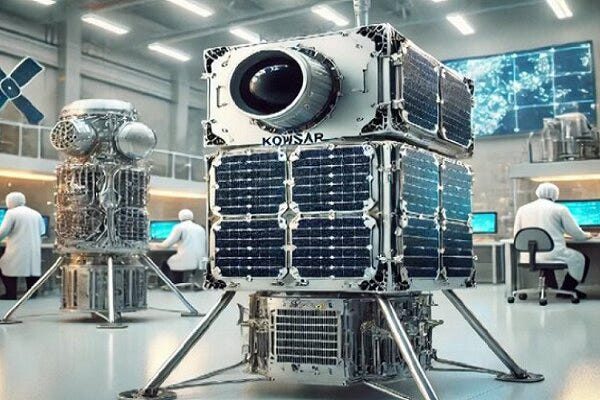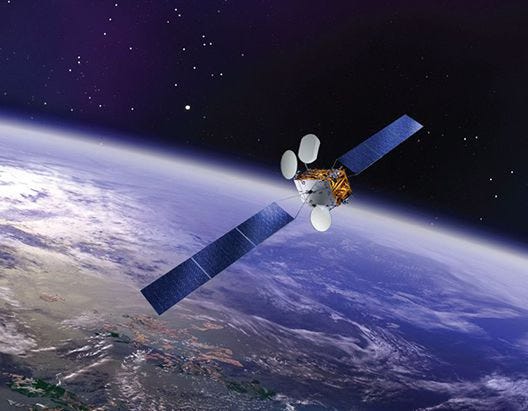Middle East Space Roundup: 28 October to 3 November 2024
A summary of all the space news in the Greater Middle East over the past week, brought to you by AzurX

The following are the major space developments in the Greater Middle East region tracked by Middle East Space Monitor over the past week:
Morocco & France to Build Communication Satellite
Morocco & France Agree to Build PanafSat Communication Satellite
PanafSat, a Moroccan company, has partnered with Thales Alenia Space through a strategic MoU to develop a high-throughput satellite communications system aimed at serving 26 African countries, including 23 Francophone nations. The project, signed during French President Macron's state visit to Morocco, will provide VHTS internet services across 12 million square kilometers, reaching a population of 550 million. This initiative aligns with both Digital Economy for Africa and Digital Morocco 2030 objectives, as well as Morocco's preparation for co-hosting the 2030 FIFA World Cup. The development follows Morocco's recent procurement of two Earth observation satellites from Israel Aerospace Industries, highlighting the country's growing commitment to leveraging space technology for socio-economic development and regional digital transformation.
Iran Space Developments
Iran’s Kowsar and HodHod Satellites Scheduled for Launch on 5 November 2024
Iran is preparing for a significant milestone in its private space sector development with the scheduled launch of two domestically produced satellites, Kowsar and Hodhod, aboard a Russian Soyuz rocket on 5 November 2024. Developed by a young team of Iranian engineers averaging 25 years of age, these satellites represent Iran's first private venture into satellite manufacturing. Kowsar, initiated in 2019, is designed for high-resolution remote sensing applications including agriculture, environmental monitoring, and disaster response, while Hodhod, leveraging technology from Kowsar and developed within a year, will focus on telecommunications and Internet of Things (IoT) services for remote areas. The satellites were transported to Russia on 11 October 2024, marking a significant advancement in Iran's commercial space capabilities.
Iran’s Shahroud Space Launch Base Targeted in Retaliatory Strike by Israel
Recent satellite imagery analysed by The Associated Press has revealed damage to a Islamic Revolutionary Guard Corps (IRGC) facility at Iran's Shahroud base following Israel's recent strike, targeting a site involved in ballistic missile construction and space launch operations. The attack, which Israel claims "severely" damaged Iran's defence capabilities, notably struck an area previously unacknowledged by Tehran in its official response, which only cited impacts in Ilam, Khuzestan, and Tehran provinces. While Israeli Prime Minister Netanyahu acknowledged U.S. "coordination and assistance," the Biden administration maintains it was not a direct participant in the operation. The strike represents a significant escalation in direct Israel-Iran confrontation and may impact Iran's solid-fuel ballistic missile capabilities, a crucial deterrent given its limited access to advanced Western weaponry, while raising concerns about further regional escalation amid ongoing conflicts in Gaza and along the Israel-Lebanon border.
Reports: Iran, Russia Near North Korean-Style Agreement - Could Enhance Iranian Satellite Systems
Recent statements from Russia's Ministry of Foreign Affairs indicate an imminent strategic security partnership agreement with Iran, following a pattern similar to Russia's recent arrangement with North Korea. The pending agreement, which has been under negotiation and intelligence community scrutiny for several months, is expected to focus on military cooperation. Intelligence analysts express concern that such a partnership could significantly enhance Iran's capabilities across multiple domains, potentially including nuclear technology, satellite systems, and advanced military aircraft, mirroring the submarine and nuclear technology transfers established in Russia's recent North Korean agreement.
Expert: Iran Now Leveraging Artificial Intelligence in its Space and Satellite Systems
Iran is advancing its space capabilities through the integration of artificial intelligence in satellite and remote sensing technologies, according to space domain expert Ahmad Soleimani. AI applications are being leveraged across multiple areas, including satellite data management and analysis, mission planning, launch risk mitigation, and automated satellite control systems. The country's space programme development includes the ongoing Par-1 and Pars-2 satellite projects, which aim to enhance Iran's high-resolution Earth observation capabilities for environmental monitoring and resource management applications, marking a significant step in the country's space sector advancement.
UAE Space News
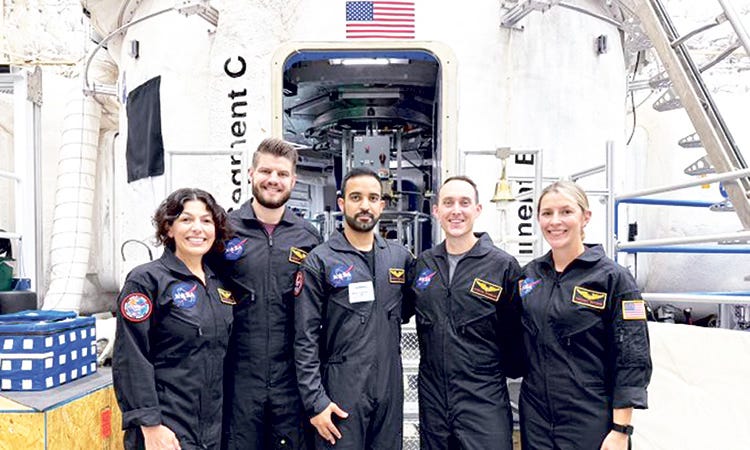
UAE Participant Starts 45-Day Mars Analogue Mission at NASA’s HERA
The Mohammed Bin Rashid Space Centre (MBRSC) has announced the commencement of a 45-day Mars simulation mission featuring UAE participant Obaid Al Suwaidi alongside three other crew members at NASA's HERA habitat in Houston. The mission, representing the fourth phase of the Emirates Space Simulation Programme's second study, involves 18 human health experiments, including six from Emirati universities. Operating within the 650-square-foot facility at Johnson Space Center, the crew will conduct various experiments including Mars surface traversal simulations, vegetation cultivation, and adaptation to five-minute communication delays, while researchers evaluate the long-term effects of isolation on crew performance and wellbeing. The mission, scheduled to conclude on 16 December 2024, aims to provide critical data for future long-duration spaceflight preparations.
UAE’s KhalifaSat Earth Observation Satellite Surpasses Five-Year Operational Lifetime
KhalifaSat, the UAE's first fully domestically designed and manufactured Earth observation satellite, has surpassed its projected five-year lifespan, marking six years of successful operations in low-Earth orbit. Developed by an all-Emirati team at the Mohammed Bin Rashid Space Centre (MBRSC), the 330kg satellite has captured over 52,000 high-resolution images, generating nine terabytes of data serving more than 90 international clients and 80 UAE organisations across sectors including environmental monitoring, urban planning, and disaster management. The satellite, which orbits Earth every 98.1 minutes and holds five patents, has documented significant regional landmarks and development projects, cementing the UAE's position in global space technology manufacturing. MBRSC is now preparing to launch its successor, MBZ-Sat, described as the region's most advanced commercial satellite, on a SpaceX Falcon 9 rocket, further advancing the UAE's space capabilities.
UAE Space Agency DG warns of Cyber Threats to Space Sector, Satellites
At the FutureSec Summit 2024, UAE Space Agency Director General Salem Al Qubaisi highlighted the growing cybersecurity challenges facing the space industry, particularly threats to satellites, space stations, and communication systems. As part of its vision to become a global cybersecurity leader by 2031, the UAE has implemented comprehensive measures, including establishing the Cyber Security Council and launching various initiatives, which have contributed to its high ranking in the 2024 International Telecommunication Union's Global Cybersecurity Index. Al Qubaisi emphasised the need for innovative solutions incorporating encryption, AI-driven threat analysis, and resilient response systems, while stressing the importance of public-private collaboration and continuous professional training in addressing these evolving space sector security challenges.
UAE Space Agency Participates in UN General Assembly Fourth Committee Meeting
The UAE Space Agency has reinforced its international space sector engagement during recent UN General Assembly Fourth Committee sessions, highlighting its major initiatives including the Emirates Mission to the Asteroid Belt, participation in the Artemis Lunar Gateway, and upcoming lunar mission. The UAE emphasised its application of space technology to address global challenges, particularly through satellite-based climate monitoring and early warning systems for extreme weather events. The country's commitment to peaceful space utilisation was underscored at both the UN sessions and a subsequent U.S.-UAE Business Council reception, which also served to promote the upcoming Abu Dhabi Space Debate in December 2024, an event that will convene industry leaders to discuss key space sector developments and challenges.
UAE Space Agency Completes Preliminary Design Review for Emirates Mission to the Asteroids
The UAE Space Agency has unveiled final designs for its ambitious 13-year asteroid belt exploration mission, scheduled for launch in 2028 with a landing planned for 2033. The mission, which represents a significant milestone in the UAE's space sector development, will traverse 3.6 billion kilometers using Venus and Earth gravity assists to reach its destination. The spacecraft will study six asteroids before concluding at asteroid Justicia, focusing on understanding water-rich asteroid origins and their potential as future space exploration resources. The project, led by local companies 971 Space and Sadeem Space for the landing vehicle development, involves extensive collaboration with national institutions including Khalifa University and NYU Abu Dhabi, alongside international partners such as the Italian Space Agency and several U.S. universities. This comprehensive scientific endeavour aims to advance understanding of asteroid composition, geology, and thermal properties while strengthening the UAE's position in space exploration.
UAE GIS Professionals Visit Esri to Exchange Lessons Learned from 2024 Floods
The UAE's geospatial information systems (GIS) professionals recently participated in an Esri Executive Briefing at the company's Redlands headquarters in the United States, coinciding with their response to historic flooding in Dubai and Sharjah. The five-day briefing, which hosted 21 delegates from various UAE municipalities, utilities, governing agencies, and telecommunications sectors, provided insights into Esri's latest developments, particularly in AI-enabled tools and ArcGIS Hub. The delegation, organized by Esri's UAE distributor gistec, engaged with Esri leadership including founder Jack Dangermond, and visited regional organisations to observe real-world GIS applications. The visit highlighted the practical applications of GIS technology in crisis response, as demonstrated by Dubai Municipality's use of spatial data during the recent floods and DEWA's management of 4.5 million assets, while fostering knowledge exchange and future collaboration opportunities between Esri and UAE organisations.
Saudi Arabia Space Developments
Saudi Arabia Courts Business with Space Companies from China, France, & United States
Saudi Arabia's space sector development initiatives with China are advancing significantly, with multiple strategic partnerships taking shape across various domains, according to Tactical Report. Recent negotiations encompass comprehensive technology transfer agreements, collaborative satellite module production, and technical training programmes between key institutions including the King Abdulaziz City for Science and Technology (KACST) and the China Association for Science and Technology (CAST). While the technical exchange programme has been postponed to April 2025, substantial progress has been made in other areas, including agreements with CASIC for satellite launch centres and CETC for military-grade surveillance equipment through Shamis Technologies. This multilateral engagement, which builds on the October 2023 establishment of ASPACE's satellite manufacturing plant in Saudi Arabia, aligns with Saudi Vision 2030's goals of diversifying technology suppliers and establishing domestic space capabilities. The collaboration extends to advanced technologies such as AI-driven satellite surveillance and encrypted military communications, with several key agreements expected to be finalised in early 2025. These Sino-Saudi space developments occur as companies from France and the United States are seeking to do business with Saudi Arabia’s Neo Space Group. These companies include Safran, Thales, Maxar, and Orbite, and demonstrate the Kingdom’s strategy to establish strategic ties in the space domain across global geopolitical divides.
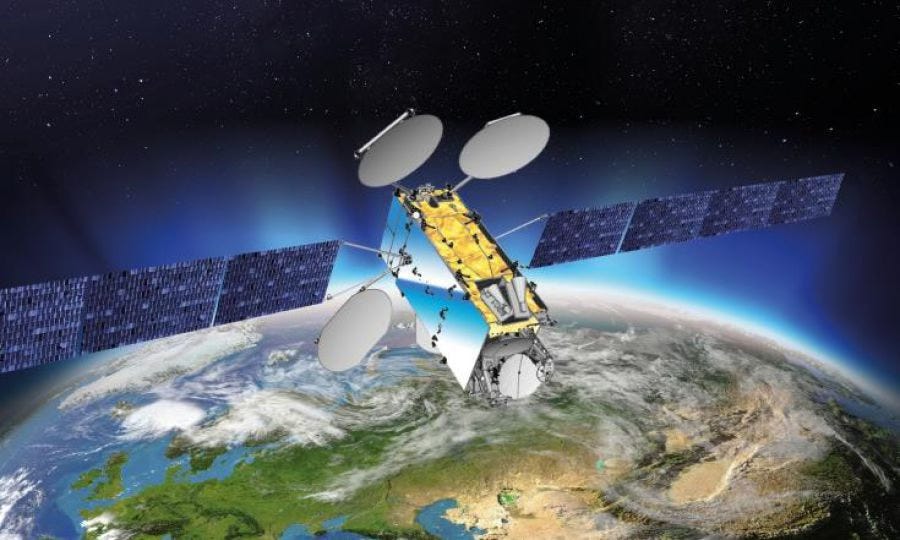
Saudi Arabia’s Neo Space Group to Provide IFC SATCOM for Thai Airways & Turkish Airlines
Saudi Arabia’s NEO Space Group (NSG) has secured its first publicly announced customer for its Skywaves inflight connectivity solution, with Thai Airways planning to equip its Airbus A321neo and Boeing 777 aircraft from 2025. The service, promising speeds up to 200Mbps, will be complimentary for Royal Orchid Plus members and premium passengers. The implementation will utilize Safran Passenger Innovations terminals with ThinKom Ka2517 antennas, installed through Airbus's HBCplus programme for new A321neos and retrofitted on existing 777s. NSG also secured a similar deal with Türkiye’s national air carrier, Turkish Airlines. NSG will leverage the SES Open Orbits network to provide global coverage beyond its own satellite footprint, which currently extends from western India across Northern Africa and most of Europe. This partnership represents a significant development for NSG, a PIF-owned company aligned with Saudi Arabia's Vision 2030, and demonstrates the evolving landscape of inflight connectivity providers. The collaboration includes flexible service options and partnerships with key industry players like Display Interactive, Eclipse, and Safran Passenger Innovations, positioning NSG as an emerging player in the global satellite services industry.
Saudi Space Agency Unveils BioGravity Initiative to Foster Space-Based Biomedical Sciences
The Saudi Space Agency has unveiled its BioGravity initiative, led by pioneering Arab Muslim female astronaut Rayyana Barnawi, to advance biomedical research in microgravity conditions. The programme aims to establish a specialised research community by bringing together scientists from Saudi universities, research centres, and private sector organisations to enhance local capabilities in space-based biomedical sciences. This strategic initiative aligns with Saudi Vision 2030's objectives by fostering international scientific collaboration, developing advanced biomedical technologies, and strengthening the Kingdom's position in global space research while creating new business opportunities in the space sector through enhanced research capabilities.
Saudi Arabia-Backed OQ Technologies Seeks €30 Million Series B for IoT Satellite Fleet
OQ Technology, the Luxembourg-based satellite telecommunications operator, is seeking EUR 30 million in Series B funding to expand its space-based Internet of Things (IoT) network, following a EUR 13 million raise in 2022. The company, which has deployed 10 satellites since 2019 and plans to launch 20 more, differentiates itself through standardised cellular technology for narrowband-IoT using 3GPP protocols, enabling existing cellular chips to connect with satellites. With initial backing from the Luxembourg Space Sector Development Fund and support from investors including Aramco's Wa'ed Ventures, OQ Technology is expanding globally with subsidiaries in Greece, Saudi Arabia, and Rwanda, while serving clients such as Aramco, Telefonica, and Deutsche Telekom. Despite estimating a potential market of 1.5 billion devices, the company faces challenges in market adoption, regulatory approvals, and increasing competition from major tech companies entering the satellite-to-phone services sector.
Saudi Arabia: NEOM’s JV with OneWeb Helps Drive Rise in Eutelsat Revenues
Eutelsat Communications has reported Q1 FY2024 revenues of €300m, marking a 9.4% increase on a reported basis and 5.9% like-for-like growth. The company's operating verticals demonstrated mixed performance, with Fixed Connectivity emerging as the strongest segment, growing 30% year-over-year to €56.5m, driven by OneWeb's LEO services, particularly from its joint venture with Saudi Arabia’s NEOM, and the Konnect VHTS satellite deployment. While Mobile Connectivity (up 19% to €42m) and Government Services (up 20% to €46.4m) showed robust growth, the core Video segment, despite a boost from the 2024 Olympics, continued its decline, dropping 7% to €152m but still accounting for 51% of total revenue. This performance reflects Eutelsat's ongoing transition from traditional broadcast services toward high-growth connectivity markets, particularly in LEO-based solutions.
Israel Space News
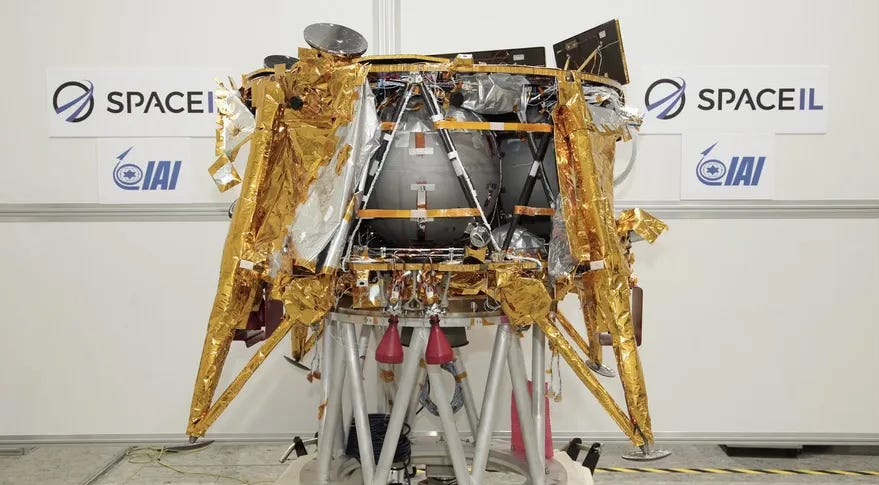
Commentator: Israel Has a Role in Moon “Colonisation”
The global landscape of lunar exploration and settlement is rapidly evolving, with multiple countries developing ambitious plans for Moon “colonisation.” Current initiatives are governed by the 1967 Outer Space Treaty and the 1979 Moon Treaty, which establish the Moon as the "province of all mankind" while allowing for commercial activities. Major programmes include NASA's Artemis, and the China-led International Lunar Research Station (ILRS), which aims to establish an Earth-Moon Space Economic Zone by 2050. Israel has emerged as a significant player through its Israel Space Agency and SpaceIL, joining NASA's Artemis programme and fostering a vibrant ecosystem of space-focused startups, particularly in life support and resource utilisation technologies. The Israeli government has committed approximately 600 million shekels ($180 million) over five years to its civilian space industry, recognising the Moon's strategic importance as a more viable near-term destination for human settlement compared to Mars, due to its proximity, reduced travel risks, and potential as a technology testing ground.
Israel’s Orbit CS to Provide Maritime SATCOM Equipment to a NATO Navy
Israel’s Orbit Communication Systems has secured a $3 million contract to provide its OceanTRx 4MIL satellite communication system to an unnamed NATO fleet through a European integrator, with installations planned throughout 2025. The military-grade system, based on the OceanTRx4 platform, features a 1.15-meter antenna capable of simultaneous operation across Ku, X, Ka Commercial, and Ka Military frequencies, supporting multiple satellite orbits including LEO, MEO, GEO, and HEO. This strategic sale of Orbit's flagship naval communications solution reinforces the company's position in the military maritime sector, with CEO Daniel Eschar highlighting the system's ability to meet the evolving communication requirements of NATO Allied navies while enhancing operational effectiveness and situational awareness.
U.S. Subsidiary of Israel’s Gilat Secured $4 Million DoD SATCOM Contract
Israel’s Gilat Satellite Networks' U.S. subsidiary DataPath has secured a $4+ million contract from the U.S. Department of Defense for its DKET 3421 portable satellite communications hubs, with delivery scheduled for H1 2025. The DKET 3421, which supports multi-carrier operations with up to 32 modems, offers a compact and mobile solution weighing under 2,268 kgs and can be deployed in less than three hours. This latest order reinforces DataPath's position in the military communications sector, highlighting the growing demand for rapidly deployable, mission-critical satellite network infrastructure that can be easily transported and operated in field conditions. The contract represents a continued vote of confidence in Gilat's ability to meet stringent military requirements for portable communications solutions.
Qatar Space Developments
Sweden Proposes Military Space Cooperation with Qatar
Sweden's Defence Minister Pål Jonson has outlined a strategic framework for enhanced defence cooperation with Qatar, building on a recently signed letter of intent during the Emir of Qatar's state visit to Stockholm. The comprehensive partnership focuses on three key areas: cybersecurity, maritime infrastructure protection (particularly underwater), and space-based military capabilities, leveraging Sweden's unique position as home to the EU's only space launch facility. The collaboration framework, announced during Milipol Qatar, emphasises Sweden's "triple helix model" involving government, industry, and academia, while potentially benefiting from Sweden's recent NATO membership and Qatar's status as a major non-NATO U.S. ally. The minister highlighted Qatar's role in international mediation and emphasised the importance of technology transfer and long-term partnerships in addressing regional security challenges.
Qatar’s Es’hailSat Showcaes SATCOM Services and Products at Milipol 2024
Es'hailSat, Qatar's national satellite services provider, is showcasing its comprehensive GOVMIL and maritime capabilities at Milipol Qatar 2024, a prominent international defence and security exhibition that took place from 29-31 October 2024. The company's participation highlights its integrated satellite communications infrastructure, which combines satellite operations with its Doha teleport facility to deliver secure, resilient managed services for government, military, and maritime sectors. Es'hailSat's offering includes critical ship-to-shore communications, data and voice connectivity solutions, supported by high-powered satellites and redundant fiber connectivity, positioning the company as a key provider of advanced telecommunications infrastructure for Qatar's defence, security, and maritime industries.
Azerbaijan Space News
Azerbaijan’s Azercosmos Partners with ZET Mobile to Provide SATCOM in Tajikistan
Azerbaijan’s Azercosmos has entered into a strategic partnership with Tajik mobile operator ZET Mobile to extend high-quality communication services to Tajikistan's remote regions using the Azerspace-2 communication satellite. The agreement aims to strengthen Tajikistan's digital infrastructure beyond its major urban centers, supporting broader socio-economic development through enhanced connectivity. The collaboration will enable ZET Mobile to provide comprehensive mobile and internet services across various settings, including vehicles and institutions, addressing the significant connectivity challenges in Tajikistan's rural areas.
Azerbaijan’s Azercosmos Reports Q3 2024 Revenues
Azerbaijan’s Azercosmos has reported revenues of $13.9 million for the first nine months of 2024 from satellite and telecommunications services across 50 countries, with exports accounting for 74% of total revenue. According to Azerbaijan's Center for Analysis of Economic Reforms and Communications, the company's major markets include the United Kingdom ($4.4 million), Luxembourg ($2.9 million), and the UAE ($736,600). However, the data shows a continuing downward trend in annual revenues, from $26.6 million in 2022 to $19.8 million in 2023, representing a 25.56% decrease. In September 2024 alone, the company exported services worth $1.5 million to 40 countries, maintaining its significant presence in the international satellite services market despite the overall revenue decline.
Other Regional Space Developments
CEO of Bahrain’s NSSA Recognised by IAF as Global Space Leader
Dr. Mohammed Ebrahim Al Aseeri, CEO of Bahrain's National Space Science Agency (NSSA), has been recognised as a "Global Space Leader" at the inaugural Space Leaders Summit, held alongside the 75th International Astronautical Congress in Italy. The prestigious acknowledgment, awarded by the International Astronautical Federation (IAF), highlights Al Aseeri's significant contributions to space sector development at local, regional, and international levels, particularly in establishing the NSSA. As a keynote speaker at the summit, which focused on "Space Capabilities for Sustainability on Earth" and drew participation from 62 countries including major space-faring states, Al Aseeri emphasised NSSA's commitment to leveraging space technologies in support of Sustainable Development Goals while advancing Bahrain's position in the global space community.
Egyptian Remote Sensing Startup Vertechx Wins 2nd Place at Climate Launchpad 2024
Vertechx, an Egyptian startup incubated at Egypt’s National Authority for Remote Sensing and Space Sciences (NARSS), has secured second place and a cash prize in the prestigious Climate Launchpad 2024 competition for Asia and Africa. The company, supported by the National Program for Technology Incubators (INTELAK), developed innovative solutions in remote sensing and environmental data analysis for climate monitoring. Under NARSS's business incubator programme, Vertechx received specialised guidance, logistical support, and manufacturing assistance during its pre-incubation phase, leading to its successful competition performance. The achievement aligns with Egypt's Vision 2030 goals and highlights the country's growing emphasis on supporting entrepreneurship in space and environmental technologies, particularly through the collaboration between academic institutions and emerging companies in the environmental sustainability sector.
Opinion: Introduction of Starlink in Jordan Poses Opportunities and Challenges
In Ammon, Dr. Hamza Al Akaleek writes that Starlink's recent licensing in Jordan marks a pivotal development in the country's digital infrastructure landscape, presenting both opportunities and challenges for the Hashemite Kingdom. The satellite internet service promises to revolutionise connectivity across Jordan, particularly in remote areas, potentially catalysing economic growth through enhanced entrepreneurship opportunities and increased foreign investment appeal. However, this technological advancement raises significant considerations regarding data sovereignty, national security, and market disruption for local telecommunications providers. The integration of Starlink's services coincides with Jordan's growing focus on AI-powered cybersecurity measures, highlighting the critical need for robust data protection regulations as the volume of transmitted data increases. As Jordan navigates this digital transformation, the country faces the complex task of balancing technological innovation with security concerns, requiring strategic investment in infrastructure and human capital while maintaining adaptability to rapid technological changes.
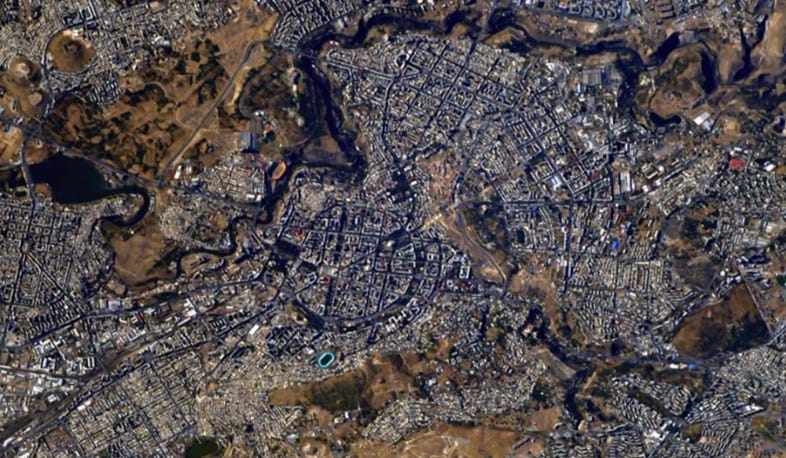
Analyst: Armenia Should Harness Space Technology for National Defence
Writing in CivilNet, defence analyst Jack Dulgarian argues Armenia faces critical decisions in modernising its defence capabilities through space technology following recent territorial losses and security challenges. The analysis highlights three key areas for development: Earth observation imagery (IMINT/GEOINT) for territorial monitoring and evidence gathering, military satellite communications (SATCOM) for enhanced command and control in mountainous terrain, and counterspace capabilities focusing on satellite jamming to counter drone threats. Rather than developing indigenous space capabilities, which would take decades, the analysis recommends pursuing partnerships with Western commercial space providers, leveraging Armenia's growing tech sector, and expanding space diplomacy through existing initiatives like the AMADEE-24 Mars analog mission and the Byurakan Observatory. These strategic priorities are positioned as achievable within a five-year timeframe and essential for maintaining Armenia's territorial integrity in an increasingly complex geopolitical environment.
Regional Space News in Short
Among the other space and satellite developments from across the region include:
The UAE and Singapore commit to strengthening cooperation across a range of sectors including satellite and space technologies;
Officials and executives from Oman and the United States met in Muscat to discuss financial partnerships and U.S. investments, including in Oman’s space sector;
Egypt’s Nilesat recorded $50.80 M in revenue, compared to $51.19 M in the first half of 2023 but a marginal improvement from $50.15 million in 2022;
Bahrain’s National Space Science Agency (NSSA) will participate in the Bahrain International Airshow from 13 to 15 November 2024;
The CEO of Bahrain’s National Space Science Agency (NSSA) received the outgoing ambassador from Türkiye where they discussed future space cooperation between the two countries.
Be sure to catch up with space activities in the region in the next edition of Middle East Space Monitor’s space roundup!




